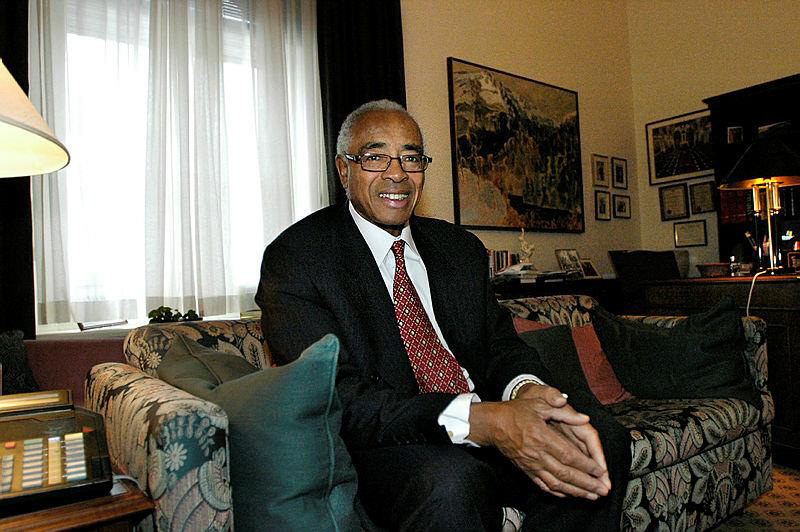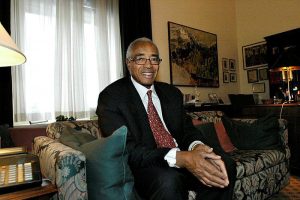
The federal government should indeed create a Department of African-Canadian Affairs and develop a strategy to address anti-black racism in the criminal justice system
.PUBLISHED : Monday, Oct. 2, 2017 12:00 AM

Donald Oliver says Prime Minister Justin Trudeau should address to UN General Assembly to talk about Canada’s overt racism, race hatred, stereotyping, economic disadvantage, injustice and unfairness directed at black African Canadians.The Hill Times photograph by Cynthia Münster
HALIFAX—A shocking and damning report to the UN Human Rights Council says racism against
black people in Canada “lies at the core” of many Canadian institutions. We’ve known that for
decades and absolutely nothing has been done about it, but now the Government of Canada has the
perfect reason to be proactive. An international call has been made for the federal government to act
swiftly and decisively to carry out recommendations of a UN working group on racism against
people of African descent in Canada.
The draft UN report being studied today says that history informs “anti-black racism and racial
stereotypes that are so deeply entrenched in institutions, policies and practices, that its institutional
and systemic forms are either functionally normalized or rendered invisible, and especially by the
dominant group.”
On Oct. 6, 2014, The Hill Times ran my op-ed, “Are Canadians racist? Yes, let’s stop denying it.”
The piece provided extensive data on institutional racism in both the public and private sectors with
recommendations on specific steps that could be taken to right the wrongs. It also set out details for
implementing “the business case for diversity” which presents a “win-win” for those who embrace it.
But now I am excited about a number of the recommendations in the UN report and one, in
particular, jumps out and catches my eye as having the potential to be effective and game-changing.
It is that the federal government create a Department of African-Canadian Affairs and develop a
strategy to address anti-black racism in the criminal justice system. The deputy minister of that new
department (who must be African-Canadian) would have a powerful and equal voice with other
deputy ministers around the breakfast table where epoch-making policies on fairness and equality
could be hatched. This would send a powerful signal from the top with the stamp of the Privy
Council Office. In my nearly 23 years in the Senate advocating and lobbying for fairness, I had often
suggested we needed a commissioner of diversity with the power and authority of our commissioners
for official languages and lobbying. But a commissioner would not have the clout of a full
government department. That’s why the new UN government department idea is really appealing. So
perhaps it was fortunate that no government would bite on my proposal.
The Government of Canada determined in the 1980s that there were four groups of Canadians who
were not treated fairly, (called the four target groups), namely: the disabled, Indigenous people,
women and visible minorities. In the mid 1980s, I was a member of the Advisory Committee to the
President of the Treasury Board on the Employment of Visible Minorities in the Public Service. Our
national group worked diligently with senior public servants seeking appropriate “special measures”
to assist visible minorities to ensure they were afforded the protection of our legal system to fair
treatment, particularly in employment, and free of racism and discrimination. But government will
did not exist to make the necessary changes we recommended.
Since the last election, the world has learned that the Trudeau government has singled out two of the
four target groups for special measures, namely women and aboriginal, and now, with the big push of
the UN report on racism in Canada today, the government is in a perfect position to make significant
advancement on the other two. African Canadians belong to the so-called visible minority group, and
now it would be wonderful if there could be another prime ministerial address to the General
Assembly of the United Nations in New York so the world can learn first-hand about the generations
of overt racism, race hatred, stereotyping, economic disadvantage, injustice and unfairness directed at
black African Canadians as it manifests itself from our largest, higher educational institutions to our
entire coveted health-care system.
But cabinet doesn’t have to do it alone. For needed special measures for minorities, the Senate of
Canada is well-positioned and has the power and authority to serve as a catalyst to strongly
encourage the executive to act now to take necessary steps to end racism against black African
Canadians that manifests itself in inequalities in housing and employment, in social mobility
exclusion, as well as the over representation of African Canadians in the criminal justice system.
What an incredible way for the new Senate to showcase its support for diversity.
Donald H. Oliver is a former Nova Scotia Conservative Senator who was in the Upper Chamber
from 1990 to 2013.
The Hill Times
Donald H. Oliver is a former Nova Scotia Conservative Senator who was in the Upper Chamber from
1990 to 2013.